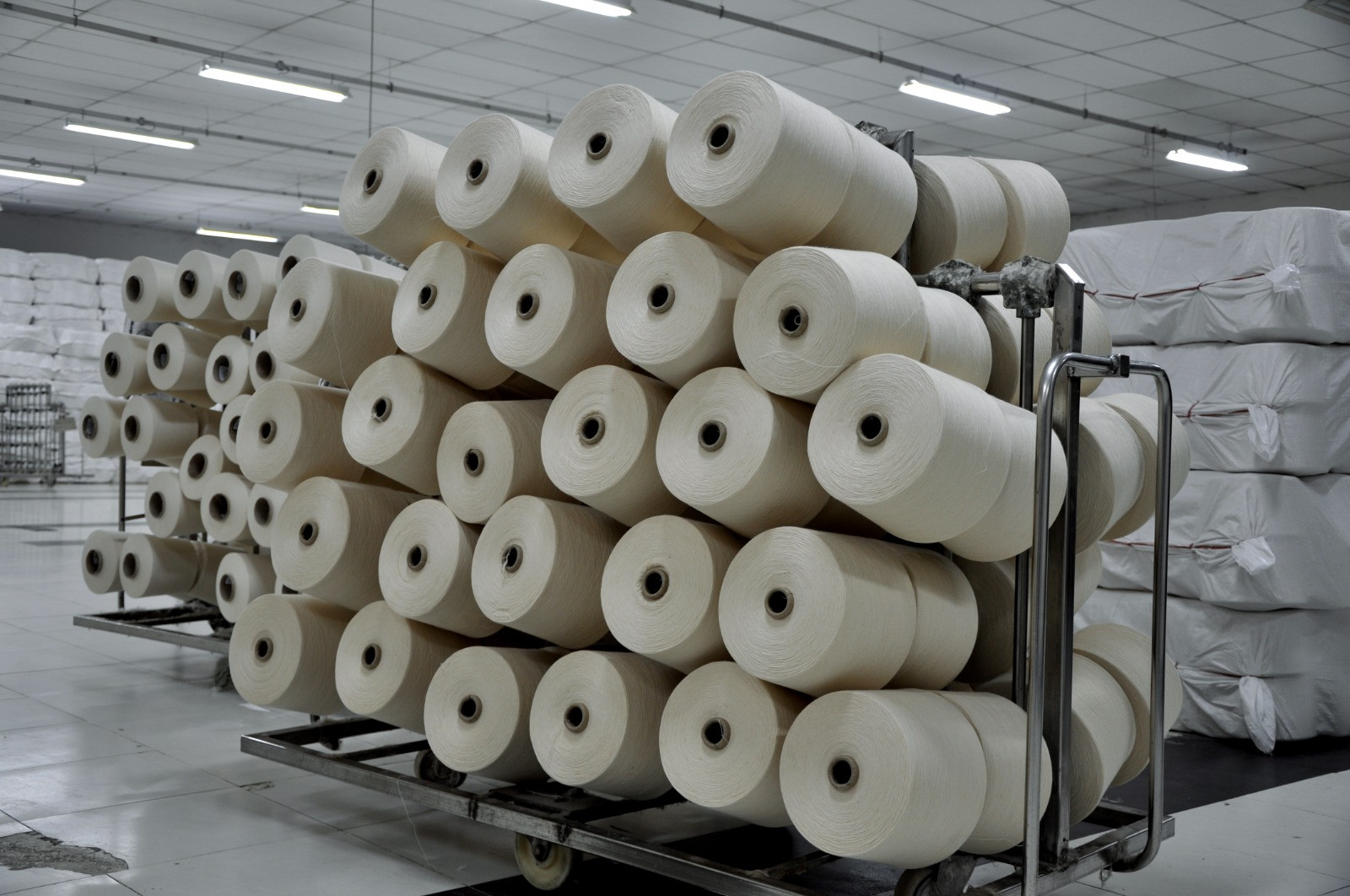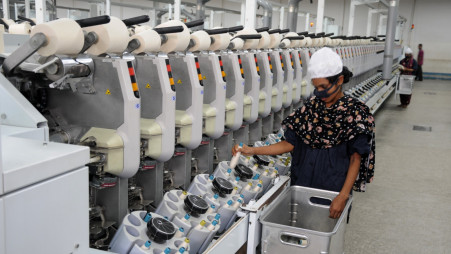'Your waste is my gold': Aman Spinning Mill's footprint in sustainable yarns
While many in the spinning mill industry struggle in their path towards sustainability, Aman Spinning Mill is breaking ground by using banana fibre, pineapple peel, betel nut in the yarn they produce

Founded as a regular cotton-led mill in 2009, Aman Spinning Mill transformed itself into an environment-friendly, sustainable yarn manufacturer around five years ago.
And why not? The world of fashion changes at warp speed; there is a new fashion trend almost every two months, which requires reduced lead time in the backward linkages of RMG production.
Also, western brands are now more serious about protecting the environment from the detrimental effects of RMG manufacturing production. And sustainable yarns have the answer to both.

"We have a slogan, that other people's waste could be our gold," said Managing Director Tahrin Aman during a recent interview with TBS at his office in Gulshan.
So how do they transform others' waste into gold?
Tahrin gives us a quick example, "the RMG scraps! They throw the scraps away."
"We collect the scraps and reprocess them into yarn, add value [value addition is the process of enhancing the salability of the product by adding some incentives to it] and export them," Tahrin said.

Besides RMG scraps, they also make yarns from recycled polyesters from plastic bottles, banana fibre, and many other types of sustainable yarns.
Aman Mill is the only Sustainable and Renewable Energy Development Authority (SREDA) accredited spinning mill in Bangladesh, the managing director told TBS.
So Aman Mill doesn't make conventional yarn anymore. They are all about sustainability now. And sustainability means optimising what sourcing materials you will be using; for example, will your cotton be recycled cotton or textile wastage? How much of the utilities, electricity for example, are used in production? And how energy efficient are you when you use natural resources like gas?

Aman Mill is also involved with a JICA-funded project about energy efficiency to develop energy-efficient machinery. The SREDA accreditation was instrumental in securing this partnership.
This mill, however, is a concern of Aman Group, the manufacturers of Lucy Olive Oil in the green can. They have diverse business portfolios. "Lucy is my mother's name," Tahrin said. "We have been in business for over 40 years in Bangladesh."
Tale of a pioneer in sustainable yarns
One of the key products for Aman Mill to weave yarns is banana fibre.
The banana trees require the least maintenance of all fruits or crops, and they will keep growing over and over.
Does Aman blend the fibre with cotton to produce the yarn?
"We are exporting to H&M, Zara etc. They have a goal with sustainable yarn. By a certain year, all their raw materials have to be sustainable. So they like it when we send them banana blended yarns."
Additionally, Aman is developing yarn with palm peel. You will see a lot of peels spread around Dhaka streets, especially in the bazaar area, during the season. Aman makes yarn with them.
Besides, they also make yarn from betel nut and pineapple peels.
"So that is how other people's waste becomes our gold," Tahrin said. "And we have massive investment in R&D to make that happen."
They developed machines to get fibres from banana, pineapple, betel nut etc and distributed them among the women living in the Ashulia region. These women are mostly housewives who work from home for them.
At the R&D level, they collected the peels from different bazaars, made yarn and gave them to brands as samples.
After receiving orders, Aman started outsourcing the raw materials through these women who collect the raw materials and make fibre with them, and sell that to Aman; thus creating a scope of employment for these women at the back end.
"It is a win-win situation. I don't have to import the raw materials as a result, and through value addition, we can export that with an additional premium on that yarn. We can have more value than what we may have from imported cotton. And its other benefit is employment at home," Tahrin said.
And he reiterates that his spinning mill is only known for sustainable fancy yarns.
"We don't do anything beyond that. Now there are different ratios to it. Some are bananas, some recycled cotton, and some recycled polyester, the percentage varies. But this is 100% sustainable," he said.
A single-focus yarn manufacturer
It is common in Bangladesh to expand into multiple areas within the textile sector once you have successfully entered the business. If you have a spinning mill, you might want to try RMG, knitting or dyeing etc.
Aman, however, didn't lose focus.
The strategy is that if you focus on expansion too much, you cannot hyperfocus on your key objective.
"When you make yarn, then knitting, dyeing comes in the way; you cannot hyper-focus on a singular sector. We do only yarn, and we are hyper-focused on it. And that is why we got out of conventional yarn and are doing fancy yarn instead."
While many in the business cannot yet think of how to diversify with yarn beyond cotton – Aman is showing the way in yarn diversification.
The lead time race
The magic of the sustainable yarns, Tahrin said, is they don't even require much dyeing. They process it in a way that the texture of the fabric, its feel, pattern and colour or look, are enough – negating the need to dye extensively after the yarn is readied.
This is what reduces the lead time, which buyers love about sustainable yarns.
Tahrin further explained the mechanics behind this. He said suppose there will be a yellow-coloured fabric with a certain pattern. What is normally done is you knit it, and afterwards you dye the fabric, followed by sewing.
"But we process the yarn in a way that right after knitting, it will go to sewing. It doesn't require dyeing. It is reducing the usage of chemicals and its impact on the environment. Meanwhile we can export it in a short time," he said.
The dyeing in the case of these sustainable yarns occurs at the fibre level, when it requires a smaller amount of chemicals. There are also options for vegetable dyeing, but this is still too expensive for the garments industry.
70% more revenues
We asked Tahrin how big his spinning mill was. He said that there are misconceptions regarding the size of spinning mills, as people concentrate the discussion only on the size of the spindles.
According to Tahrin, you cannot judge a spinning mill based on capacity, rather a spinning mill will have its brand value from its niche market, diversity and value addition.
"How much am I earning from each spindle? And how much are others making per spindle? That is what it depends on," he said. "Size is not the factor; it is the value addition that is the factor."
"We are 15% more energy efficient, and we have 70% value addition, which means we have 70% more revenues," he added.
We also asked why small-scale local entrepreneurs, for example, the ones making banana fibres on a small scale, are struggling. Tahrin said it is not only about innovation but also about scalability.
"We also have cotton in Bangladesh, but that is not enough to meet the appetite for cotton. Bangladesh is the second largest cotton importer in the world. So, however [much] cotton is produced here, [it] is not benefiting us very much," Tahrin said.
"They find out something sustainable through research and all. But if they cannot expand it, it will not create an impact at an industrial level. So that is what the problem is," he added.
Globally, sustainability is a part of the SDG. Brands are heading towards 100% sustainable raw materials sourcing. But Bangladesh is lagging behind in that aspect.
Tahrin believes that the change will come if we can use local raw materials as sustainable alternatives. This will help grow our local market, creating some employment in the back end in processing the fibres, and also keep dollars from leaving the country.
Tahrin said that "We are bringing [in] dollars by sourcing raw materials locally, adding value and exporting the yarns. We have many layers of impact."




 Keep updated, follow The Business Standard's Google news channel
Keep updated, follow The Business Standard's Google news channel
















